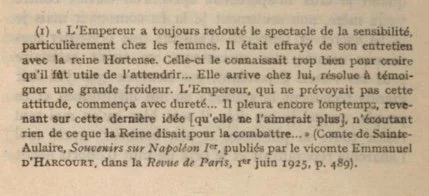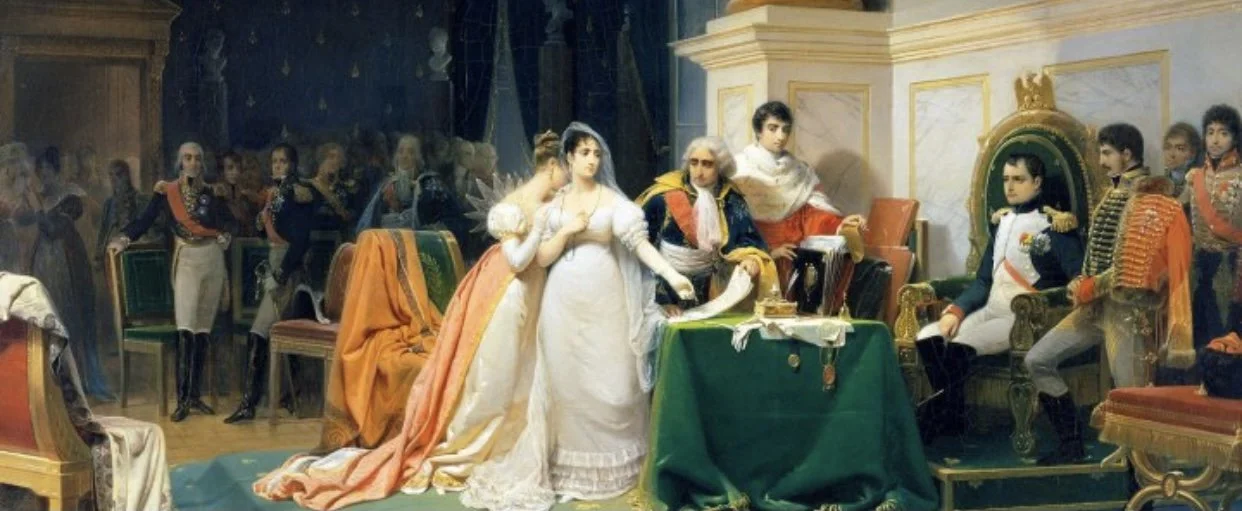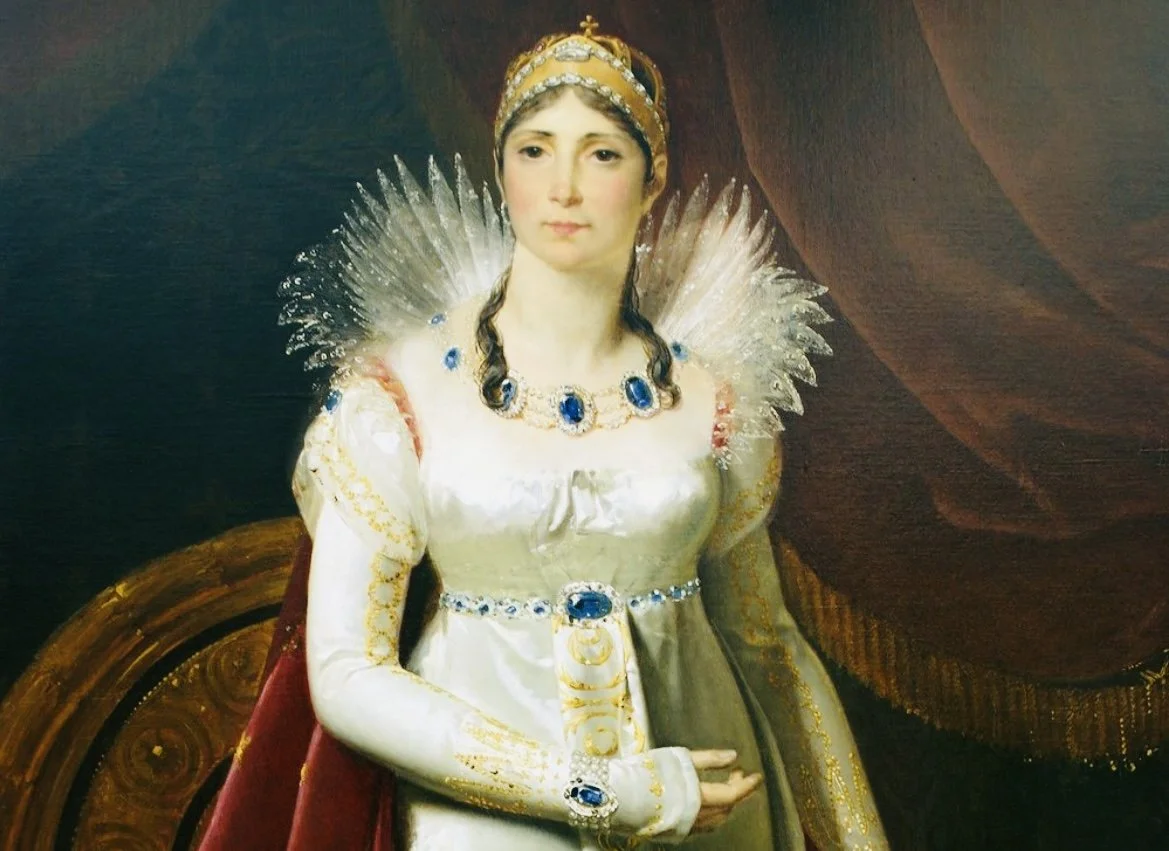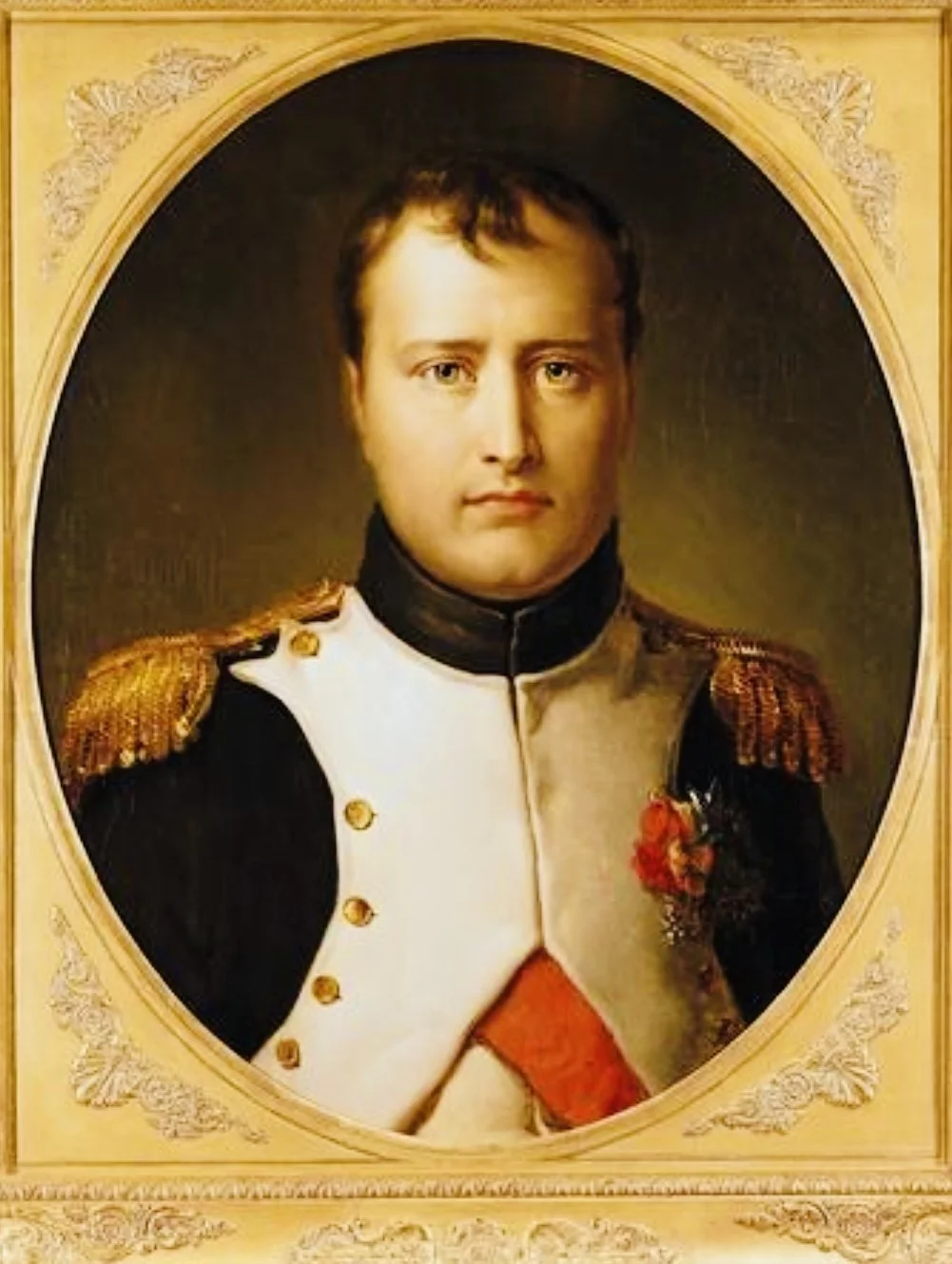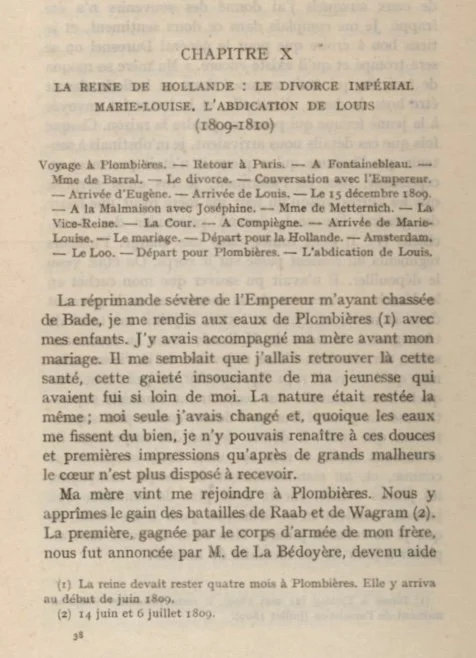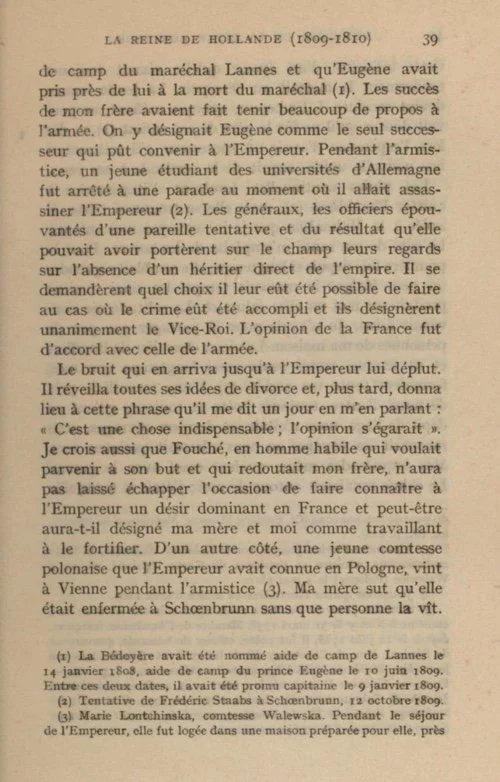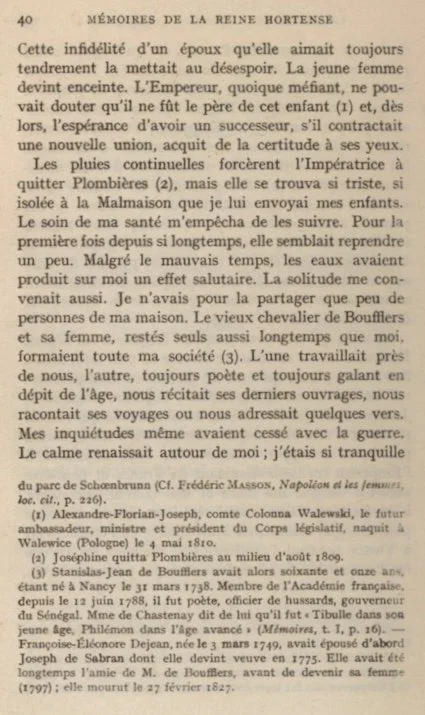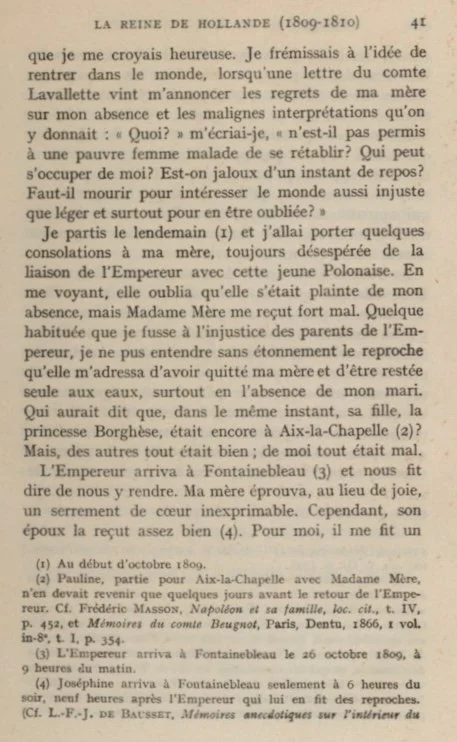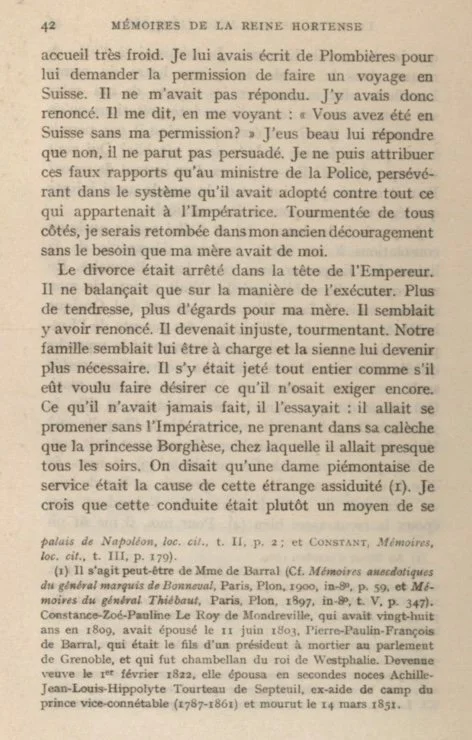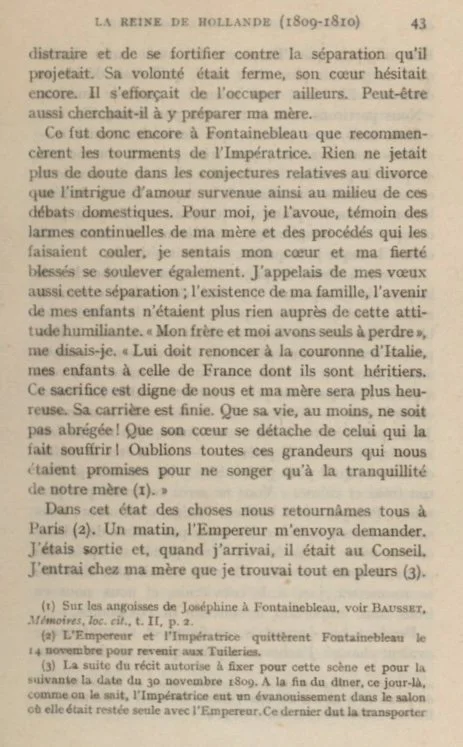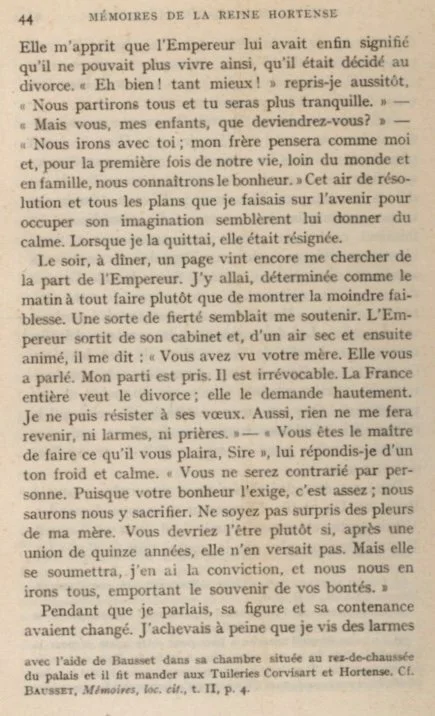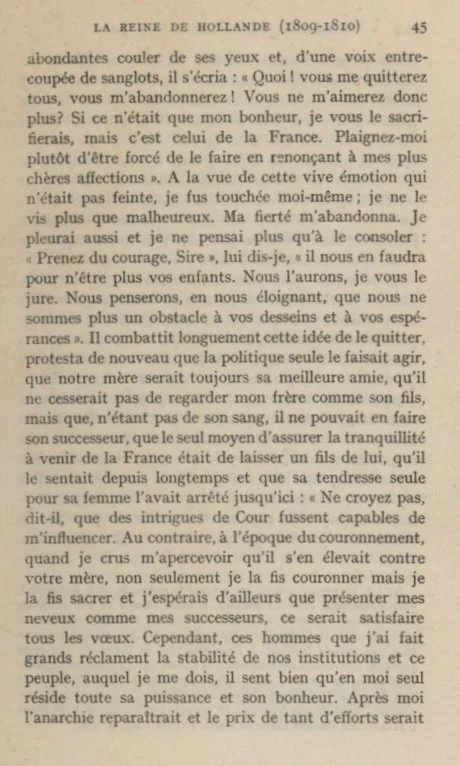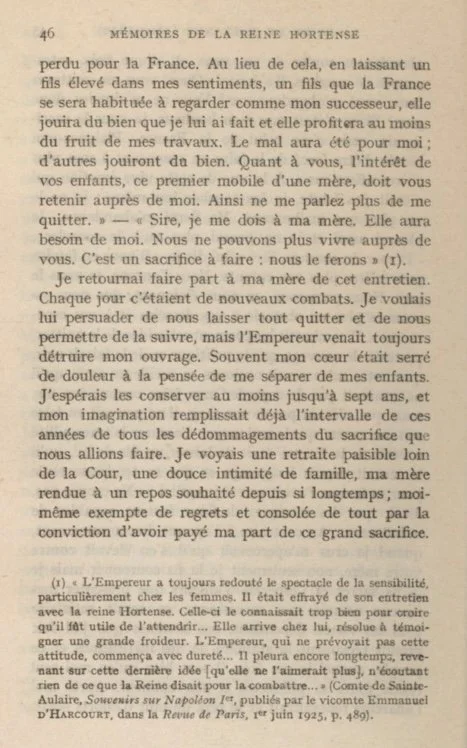Let’s have another look at Hortense’s Memoirs. If you want to read the book it is available for free at the side bar in English and French. Use the widget on the sidebar to translate the text below into pretty much any language.
All the machinations finally bring on Napoleon’s divorce. While Napoleon was generally fairly adept at hiding the enormity of his feelings, he also couldn’t really hide much from Hortense.
To make a point that I’ve been trying to prove for years, I’m posting a footnote from the French edition of Hortense’s Memoirs. Another memoirist recorded the emotional scene between Napoleon and Hortense and wrote that Napoleon broke down and cried for a long time returning to the idea that Hortense didn’t love him anymore and that Napoleon couldn’t hear anything she was saying to combat his belief in this fear.
Hortense’s memoirs continues:
CHAPTER IX
THE DIVORCE OF JOSEPHINE: THE MARRIAGE OF MARIE LOUISE: THE ABDICATION OF LOUIS (1809-1810)
A Trip to Plombieres—Return to Paris—Madame de Barral—The Divorce Is Decided on—The Arrival of Eugene and Louis—Fêtes at Paris—December 15, 1809—With Josephine at Malmaison—Madame de Metternich—The Emperor's Dancing Lesson—Hortense as Viceroy—Life at Court—The Arrival of Marie Louise—The Emperor's Marriage —Hortense Leaves for Holland—At the Palace of Amsterdam and the Château of Loo—Departure for Plombieres—Louis Abdicates.
THE Emperor's severe reproof having driven me from Baden, I went with my children to take the waters at Plombieres. I had been to the same place with mother before I married.
I believed I should recover there some of my lost health, some of that gay lightheartedness of youth, which I had not known for so long. When I returned, I found nature had remained the same and only I had changed.
Although the waters did me good. I could not recapture those early emotions which a heart that has known sorrow can never feel again. Mother joined me at Plombieres. While we were there, we received news of the successful battles of Raab and Wagram.
The former victory, won by the army corps which my brother commanded, was announced to us by Monsieur de La Bedoyère, who had become aide-de-camp to Marshal Lannes and whom Eugene had attached to his staff after the Marshal's death.
My brother's continued successes were much commented on in the army. He was considered the Emperor's one legitimate successor.
At the time of the armistice a young German student was arrested during a parade when he was on the point of assassinating the Emperor. The generals and other officers, shocked that such an attempt should have been made and alarmed at the idea of what might have happened, had considered seriously the situation arising from the absence of any direct heir to the imperial throne.
They debated who might have been chosen as the Emperor's successor had the attempt succeeded, and unanimously voted for the Viceroy.
Public opinion throughout France endorsed the verdict. Rumors of this reached the Emperor and displeased him.
They revived all his ideas concerning a divorce and later caused him to say to me during one of our conversations: "It became a necessity; public opinion demanded it."
I believe also that Fouché, with his skill for intrigue and dislike for my brother, took advantage of the episode to bring the matter of a divorce again to the Emperor's attention.
He perhaps even mentioned that my mother and I were deliberately engaged in promoting Eugene's popularity.
At the same time a young Polish countess whom the Emperor had met in Poland appeared in Vienna during the armistice.
My mother knew that this person had been locked up with him in the palace of Schönbrunn although no one caught a glimpse of her. This unfaithfulness on the part of a husband to whom she was still tenderly devoted pained her deeply.
The young woman became pregnant. The Emperor in spite of his suspicious character could not doubt that he was the father of her child, and from that moment on, the hope of having a direct heir in case he married again established itself firmly in his mind.
Continued rain forced the Empress to leave Plombieres, but she felt so sad and so alone at Malmaison that I sent my children to keep her company.
My health prevented me from going with them. For the first time in many months I seemed a little stronger. In spite of the bad weather the waters had done me good.
To be alone there also agreed with me. Very few members of my household were in attendance. The old Chevalier de Boufflers and his wife, who were also alone, were the only people I met.
The wife sewed with me while the husband, still a poet and still a charmer in spite of his age read us his latest works, described his travels or wrote verses.
My uneasiness had disappeared with the close of the hostilities. Once more I felt that peace had come back to my heart. I was so contented that I thought I was happy.
I disliked the idea of returning once more into society. One day a letter from the Comte de Lavallette arrived, saying how much mother was missing me and what malicious gossip my continued absence had provoked.
“Is it possible," I exclaimed, "that a poor sick woman is not allowed to attempt to regain her health in peace? Why do people bother their heads about what I am doing? Who can be jealous of my quiet lot? Must I die in order to make myself uninteresting to these busy-bodies, who are as unjust as they are unfair, or better still have them forget me?"
I left the following day and sought to console my mother, still deeply hurt over the Emperor's liaison with the young Polish lady.
When she saw me, she forgot that she had complained of my absence. But Madame Mère gave me a very chilly reception.
Although I was accustomed to being unfairly treated by the Emperor's relatives, I was nevertheless surprised to have her reprove me for having left my mother, and for having remained alone at a watering-place, especially when my husband was not with me.
To hear her no one would have suspected that at the same time her own daughter, the Princess Borghese, was alone at Aix-la-Chapelle. All that others did was right, all that I did was wrong.
The Emperor arrived at Fontainebleau and sent us word to join him there. My mother instead of being delighted felt worried about the future.
Nevertheless, her husband received her in a fairly friendly manner. His greeting to me was distinctly cold. I had written him from Plombieres asking permission to take a little trip to Switzerland.
He had not answered me. Therefore, I had given up the idea. The first thing he said to me was, "Did you go to Switzerland without my permission?"
Although I assured him, I had not done so he did not seem to believe me and I was forced to think he must have received false reports from the Minister of Police, who pursued his tactics of being hostile toward everything and everybody relating to the Empress.
Thus, rendered miserable by all sorts of unpleasant incidents I might have relapsed into my previous state of discouragement had I not had my mother with me.
The Emperor had made up his mind to obtain a divorce. He was only hesitating as to what means to employ. All his affection, all his tenderness toward my mother had disappeared.
He became unjust and vexatious in his attitude. He seemed to feel that our family was a burden to him and he sought the society of his own relatives. He devoted all his time to them as though he were seeking to make us desire what he did not as yet dare to ask for himself, namely, a divorce.
He did things he had never done before, as for instance going driving without the Empress and only accompanied by the Princess Borghese, whom he went to visit almost every evening.
It was said that a certain woman from Piedmont was the reason for this strange assiduity. I am inclined to think that the Emperor's behavior was merely an effort to distract his mind from what lay before him and to fortify his decision to obtain a separation from his wife.
His mind was made up, but his heart still resisted. He sought to occupy it elsewhere. Perhaps he also was trying to prepare my mother. Thus, it was at Fontainebleau that the Empress again began to suffer. This love intrigue carried on in the very midst of our domestic life added new fuel to the rumors of an approaching divorce. As for me, I admit that I grew indignant as I watched my mother's tears flow and became aware of the methods being used to provoke them.
My pride was hurt; I wished that the divorce had already been pronounced. My family's rank, my children's future, nothing mattered as much as this humiliating position in which we now found ourselves.
“My brother and I are the only ones who have anything to lose," I said to myself.
“He will be forced to give up the Italian throne. My children will no longer be heirs to the crown of France. But this sacrifice is one that is worthwhile making.
Mother will be happier. Her career is over; at least let us hope that her life may not be shortened by her suffering. If only she could cease to care for the man who is hurting her.
Let us forget all those splendid promises the future held for us and think only of insuring our mother's peace of mind." This was how things stood when we returned to Paris.
One morning the Emperor sent for me. I was out at the time and when I came in he was at a cabinet meeting. I went in to see my mother and found her crying.
She told me that the Emperor had at last informed her he could no longer live as he was doing, that he had decided to divorce her.
“Well, all the better," I replied quickly. "We shall all leave the court and you can lead a quieter life."
“But what will become of you, my children?"
“We shall go with you. My brother agrees with me. For the first time in our life, far from the crowd we can really know what it means to be happy."
This way of looking at things and these plans I made for the future in order to give her something with which to occupy her mind seemed to calm her feelings.
When I left her she seemed resigned to her fate. That evening at dinner a page brought me word the Emperor wished to see me. I went to him as determined as I had been in the morning not to display the least sign of weakness. A sort of pride seemed to strengthen my will. The Emperor stepped out of his study. His manner at first was abrupt; later it became more animated.
He said to me: "You have seen your mother. She has told you what has happened. My decision has been made. It is irrevocable. All France wishes me to secure a divorce. It demands this loudly. I cannot oppose my country's will. Therefore, nothing will make me change my mind, neither prayers nor tears."
“Sire," I replied, in a calm, icy tone, "you are free to behave as you please. No one will seek to thwart you. Since your happiness makes this step necessary, that is enough. We shall know how to sacrifice ourselves on your behalf. Do not be surprised if my mother weeps. Indeed, it would be more surprising if she did not do so, after fifteen years of married life. But she will submit to your will. We shall all leave your court remembering only the kindness you have shown us."
While I spoke, his face and expression changed. Hardly had I finished when abundant tears started from his eyes, and it was in a voice broken by sobs that he exclaimed: "What! All of you leave me? You will desert me! Don't you love me anymore? It is not to insure my happiness but that of France that I am acting as I am. You ought to pity me for being obliged to sacrifice my most cherished affections."
At the sight of this emotion, which I felt was sincere, I was also touched. I was conscious only that he was unhappy. My pride gave way. I also wept, and my only thought was how I could console him. "Be brave, Sire," I said.
“We shall need courage ourselves at the thought of no longer being your children. But I assure you we shall know how to be brave. We shall understand that in leaving you we are removing an obstacle that stands in the way of your plans and hopes."
For a long time he protested against the idea of our departure, assuring me again that his actions were entirely based on political grounds, that my mother would continue to be his dearest friend, that he would not cease to consider my brother as his son, but that not being Eugene's father he could not make him his heir.
He said that the one way of assuring peace for France was to leave his throne to his own child: he had realized this some time ago, and only his affection for his wife had prevented him from asking for a divorce before.
“Do not believe," he said, "that court intrigues could influence me in any way. On the contrary at the time of the coronation, when I felt that there was a party hostile to your mother, not only did I cause her to be crowned, but I also had her anointed.
At that time, I hoped that by presenting my nephews as my heirs I should satisfy public opinion. But the men I had made powerful insisted that dynastic stability must be assured, and the common people, to whom I feel I am indebted, believe that I am the only protector of their safety and happiness.
After me anarchy will break out again and France will lose the fruit of all she has worked so hard to obtain. Instead of that, if I leave a son brought up in accordance with my ideals, a son whom France will have formed the habit of considering as my heir, the country will be able to enjoy what I have done for her and at least she will benefit by my efforts on her behalf. I shall have borne the pain, others will reap the reward. As for you, your children's interests, which are what a mother should always consider first, ought to keep you here with me. Therefore, I will not listen to any talk of your going away."
“Sire, my duty is to be with my mother. She will need me. We can no longer live near you. That is a sacrifice we must make. We are prepared to make it."
The original French is available below:

